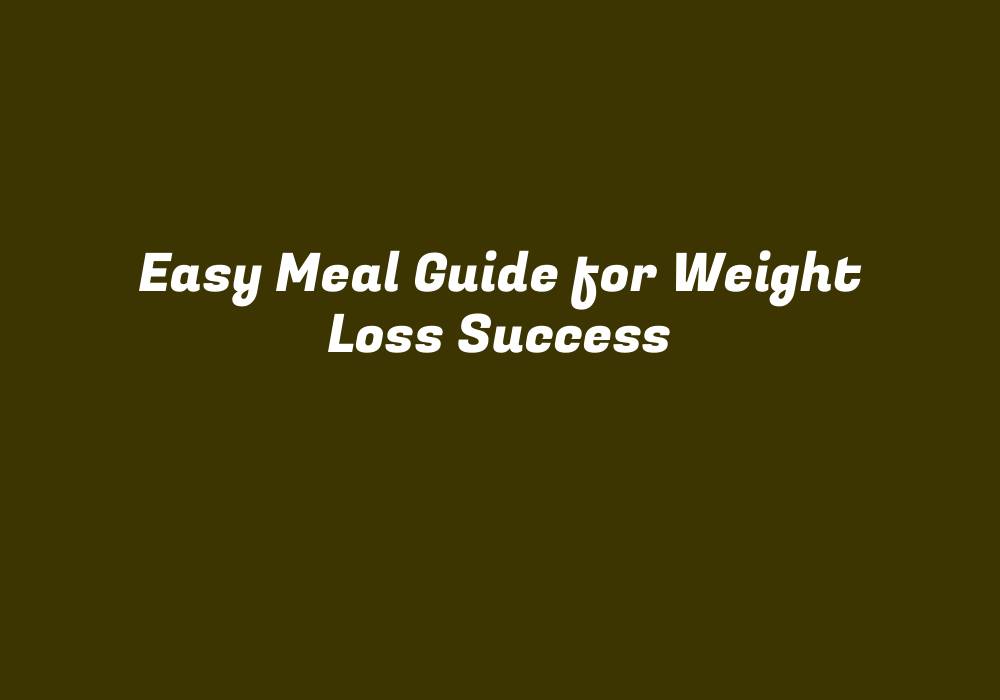Easy Meal Guide for Weight Loss Success
Introduction to Eating for Weight Loss
Weight loss success often depends on a combination of factors including exercise, calorie intake, and the foods we eat. It’s essential to have a good understanding of what types of food can help in our journey towards better health. This article will provide you with an easy meal guide that focuses on weight loss while ensuring your body gets the nutrients it needs.
Focus on Whole Foods
The foundation of any healthy diet should be whole foods, such as fruits, vegetables, lean proteins, and whole grains. These nutrient-rich options help fill you up without packing on extra calories and contain essential vitamins and minerals for optimal health. Here’s a brief outline of different food groups to focus on:
1. Fruits: They are naturally sweet and can satisfy your cravings for something sugary. Add a variety to your diet, such as apples, berries, bananas, oranges, and more, to keep things interesting.
2. Vegetables: Load up your plate with an array of colorful vegetables like broccoli, spinach, kale, sweet potatoes, carrots, peppers, and many others. These low-calorie powerhouses are packed with essential vitamins and minerals that help support overall health.
3. Lean Protein: Choose lean proteins such as chicken, fish, tofu, beans, or eggs for a healthy dose of energy. They will provide your body with the nutrients needed to function effectively and keep you feeling fuller longer.
4. Whole Grains: Include whole grains like quinoa, brown rice, oatmeal, and whole wheat pasta in your diet. These complex carbohydrates are a great source of fiber which helps slow digestion and keeps you feeling satiated.
5. Healthy Fats: Consume healthy fats such as olive oil, avocadoes, nuts, and seeds in moderation to add flavor and promote heart health.
6. Dairy or Alternatives: If you can tolerate dairy, choose low-fat options like skim milk or Greek yogurt. Otherwise, consider non-dairy alternatives such as soy milk or coconut milk. These provide essential nutrients needed for good health while being kind to people with lactose intolerance or those following a plant-based diet.
Meal Planning Tips for Weight Loss
Having a meal plan will help ensure you stay on track towards your weight loss goals and prevent last-minute, less healthy options. Here are some tips to follow while planning meals:
1. Balance Your Plate: Aim for half of the plate to be filled with non-starchy vegetables, one-quarter for lean proteins, and a smaller portion for whole grains or healthy fats.
2. Portion Control: Pay attention to serving sizes to avoid overeating. Use measuring cups or scales when possible to get an accurate idea of the amount you are eating.
3. Choose Fiber-Rich Foods: Fiber-rich foods help you feel full longer, which can prevent overeating and snacking between meals. Incorporate high-fiber options like whole grains, beans, fruits, and vegetables in your diet.
4. Plan Meals Around Low-Calorie Options: Make meals that naturally have fewer calories, such as stir-fries with lean protein and vegetables, or a salad with tofu. This will help manage calorie intake while still feeling satisfied after eating.
5. Limit Processed Foods: Opt for whole foods instead of processed options, which are often packed with hidden sugars and unhealthy fats. These processed foods can contribute to weight gain and other health issues.
6. Stay Hydrated: Drink plenty of water throughout the day as thirst can sometimes be mistaken for hunger, leading to overeating. Staying hydrated will also help keep your metabolism running optimally.
Conclusion
Implementing a well-balanced meal plan that focuses on whole foods and good portion control can significantly contribute to weight loss success. By making healthier choices, you can nourish your body with the nutrients it needs while still enjoying delicious meals that support a healthy lifestyle. Remember, consistency is key, and small changes made over time can result in significant progress towards better health and overall well-being.
